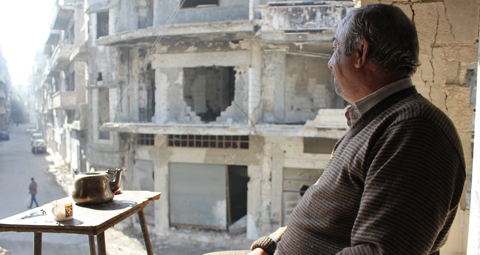December 14 | ![]() 0 COMMENTS
0 COMMENTS ![]() print
print

SCIAF find an incredible priest in the ruins of Aleppo
A visit to the bombed-out northern Syrian city, once the Milan of the Middle East, reveals the enduring power of devotion and Faith and why it is vital we each continue to give our support to those stricken by a brutal civil war, writes SCIAF director Alistair Dutton
“They send us death and we give them back life. They throw hatred at us and we offer love in return.”
These profound words from Franciscan Friar Fr Ibrahim Alsabach of Aleppo beautifully illustrate the spirit of the Catholic Church in Syria as it works tirelessly to help people survive the country’s devastating war.
With money from our generous supporters, SCIAF is working with Fr Ibrahim’s parish, Caritas Syria and others to provide food, clothes, water, blankets, medical care, money for rent and heating fuel, as well as help to repair homes, to 44,000 people.
On a visit to Syria in November I travelled to Aleppo, Homs and Damascus to see our work first hand and show solidarity with our long-suffering Syrian brothers and sisters.
I was staggered by the sheer scale of destruction that the war has caused.
A city in ruin
Mile after mile we drove past suburbs which have been bombed to smithereens, leaving completely flattened or partially destroyed buildings and mountains of rubble.
The war seems to be in its final phase with the Syrian Government’s forces now in control of the vast majority of the country with only isolated areas such as Idlib still being contested.
For many families, the nightmare of years of bombing, constant gunfire and the ever-present risk of death has now lifted.
But while many survived the war, they are now struggling to survive the peace.
The vast majority of the 11 million civilians who stayed in Syria have been driven into extreme poverty by the war. The country’s economy is on its knees, there are few jobs, wages are low, supplies and hard currency are in scarce supply, and prices for basics such as food and oil for heating are sky-high.
There is a daily fight for survival for many thousands of families to find food so they can eat that day and oil so they can heat their homes for an hour in the evening as the cold winter sets in.
Holiness amid adversity
When I met Fr Ibrahim and listened to him I felt I was in the presence of holiness. He is a truly inspirational man who has stayed with his people throughout the war, responding with great empathy and generosity, and is now helping many thousands of people.
“We feel today, not only Christians but as Syrians, that we are not in Heaven and not on the earth—but on the Cross. We don’t know about the future. We don’t yet see a future for ourselves and our families,” he said.
“Two years after the ceasefire [in Aleppo] we see the city is still destroyed. Economically we are a city that used to be like Milan, making 60 per cent of the country’s industry, but now it has been transformed to a small village, without any type of work and only a little money in the local economy.
“At the same time we see hospitals without instruments, sick people without medicine and without the possibility of any type of assistance. We feel we are invited, as the Church, to stand in front of the people and help the families and children.
“We are helping in two ways. We give emergency help such as water, food, electricity, and healthcare including medicines.
“We are also giving assistance to young couples with children who were born during the crisis. It’s hard to imagine that today parents cannot afford clothes for their children.
“The second way we have been supporting people is helping them to reconstruct their houses and start up some small business enterprises for the people who have the ability and talents to work so they can move from dependency on humanitarian aid to being independent.
“So far we have repaired 1,250 houses which had differing levels of damage, helped 500 small economic projects, provided 1,300 young families with children with food, clothes, nappies and medicines, and we plan to distribute clothes for another 900 children.
“In this way the Church has always been present, to help not only the Christian faithful but to help all the citizens, as much as it could do.”
Caritas
The good work of Fr Ibrahim is mirrored in other parts of Aleppo too. In Jabal Badro, an area of the city that was pulverised during the siege of the city, Caritas—of which SCIAF is a part—has set up an office and distribution centre to provide food, blankets, clothes, medical care, and many other of life’s essentials to the extremely poor, predominantly Muslim population.
The presence of Caritas has really helped to rebuild bridges between communities who were separated during the war.
I spoke to Hanan Bali, Caritas Aleppo’s projects coordinator. She told me: “The relations between the Christians and Muslims has improved substantially. Before the war there was a big wall between Christians and Muslims.
“Now they know us more. Through the presence of the Caritas team we have come to know each other—we are all Syrians. It is an important beneficial effect of our project.”
Ms Bali was one of a team of Caritas workers who first went into the Jabal Badro area when the fighting in the area first stopped.
“When I first went in there was rubble and the whole place was destroyed,” she said.
“The roads were all blocked with rubble. We were afraid of landmines. The army reassured us that they had cleared the area. The small main road was clear.
“When we went in all the people came out of hiding to see us. They were astonished when they saw us climbing over the rubble to go to them. They asked ‘Are you Christian? You should be helping Christians, not us.’ They were very surprised.
“Our team was very young, they were afraid of the people. It was the first time many had seen such incredibly poor people.
“In the first week the girls in the staff were crying and some asked, ‘Why are we helping them, they have been attacking us?’ But day by day, they discovered they were people, just women and children and the elderly. All the men had gone.
“I always tell my children and the team here, when you know people you will love them.
“They have suffered, probably more than us, with no food and no electricity. Every house there were people lost to shells and bombs.
“At first we provided vouchers for clothes. They were very poor. They didn’t have any clothes; they were without winter clothes. The children did not have shoes. We physically took them to the shops to buy clothes. For many of the children, it was the first time they went to the shops.
“After many visits by us and Bishop Audo and many priests, the staff told the people ‘The Church will help you,’ and they began to trust us.
“In the local office we also employ four Muslims and they have been a bridge. They play an important role in explaining who Caritas is, what we do, and how we get money from donors. We are very transparent.
“Now we are very close and our relationship is very strong.
God’s love
As deeply troubling as it was to see a country torn apart by war, and meet so many people who have suffered so much as continue to struggle to meet their basic needs on a daily basis, it was deeply inspiring to see such pure expression of God’s love for us in the work of the Church in Syria.
I was humbled by the presence of those I met and touched by Fr Ibrahim’s parting words to me: “I thank God for all that He is doing in Aleppo.
He is doing miracles every day, and we can see Him, touch Him and feel His tender presence through our many friends. We thank Him and we thank you who are praying for us and helping us. We hope that this communion will always be fruitful for all the people.”
Alistair Dutton is the director of the Scottish Catholic International Aid Fund (SCIAF).
To donate to SCIAF’s work in Syria and around the world, visit www.sciaf.org.uk.










